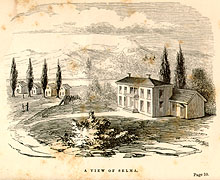When Dr. Boswell of Virginia brings his new Pennsylvanian wife home to his
plantation, it serves as Page's occasion to initiate Northern readers into his
version of slavery, one in which the only source of discontent among slaves are
abolitionists who lead them astray with false promises about freedom. When a
slave named Tom does run away, and when Mr. Benson of Boston takes his new
Virginian wife home with him to Massachusetts, Page can reveal his version of
life in the North: it is a place where everyone from the South -- fugitive,
bride and the free black "mammy" she takes with her -- dies. It is perhaps
needless to say that Mrs. Boswell winds up living happily ever after on the
doctor's plantation.
CHAPTER 7, the account of the death of
Robin's wife Dinah, is very similar
to CHAPTER 7 in Frank Freeman's
Barber Shop (1852). That chapter is titled "Death of Dinah." Both Dinahs
were born in Africa as "heathens," but die redeemed Christians who
are grateful to slavery for saving their souls. There are similar scenes in
other "Anti-Tom"
novels, and of course Stowe's Tom himself dies with joy. He doesn't say Legree and slavery have saved
him, but he does say that Legree "an't done me no real harm,--only opened the gate of the
kingdom for me; that's all."
Digital text prepared with the help of the
Wright American Fiction Project, Indiana University Library.
Uncle Robin in His Cabin in
Virginia, And Tom Without One in Boston
By J. W. Page (Richmond: J. W. Randolph, 1853)
Illustrated.
|


